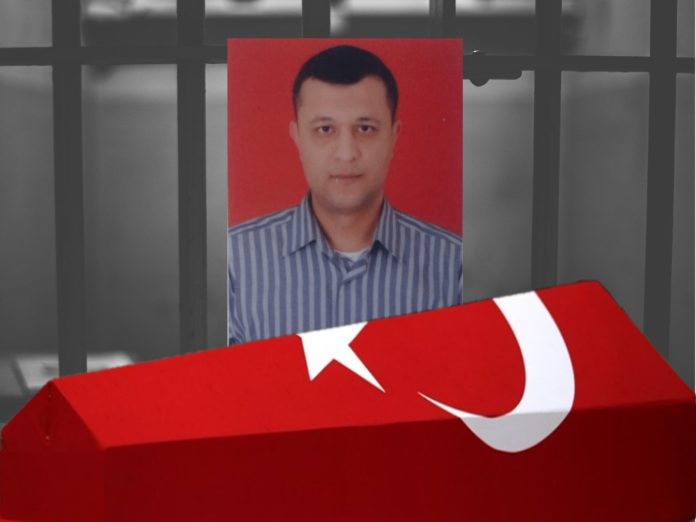Mustafa Barış Avıalan, a former staff colonel sentenced to life imprisonment on coup charges, died in prison after a court denied his release despite health reports stating that his sentence needed to be postponed for six months.
Avıalan’s death was announced by human rights defender and pro-Kurdish Peoples’ Democratic Party (HDP) deputy Ömer Faruk Gergerlioğlu from his Twitter account. In his tweet Gergerlioğlu quoted Avıalan’s words from a previous letter: “As a sick person who is nearing death, I need all kinds of support. My condition is very bad. I am in so much pain.”
NE OLUYORUZ?
Cezaevlerinde bir ölüm daha!
KHKlı Mustafa Avıalan:"Hasta ve ölüme çok yaklaşmış bir insan olarak her türlü yardıma ihtiyacım var. Durumum çok kötü. Çok acı çekiyorum."
Adli Tıp raporuna rağmen tahliye edilmedi!
Bugün vefat etti
— Ömer Faruk Gergerlioğlu (@gergerliogluof) October 15, 2020
Col. Avıalan suffered from cardiac insufficiency, pleural effusion, COPD and cardiac cirrhosis. His condition had deteriorated after he was initially denied treatment despite suffering from heart disease and kept in solitary confinement.
A health board at the Ankara Yıldırım Beyazıt Teaching and Research Hospital had issued a report in August requesting his release based on Article 16 of the law on the execution of sentences, which stipulates “If the execution of a sentence poses a risk to the life of the convict, execution of the sentence is postponed until the convict has recovered.” The prison administration filed a request for the postponement of the execution of his sentence based on the report.
The administration’s request was before Turkey’s Supreme Court of Appeals. Yet, according to a source who spoke to 15temmuzinfo.net, a website giving voice to soldiers purged from the military by the government and their families, the court was deliberately not ruling on the case. Court officials had said, “Don’t bother, we cannot postpone the execution of the sentence of an inmate who received 141 life sentences.”
Avıalan was a decorated officer and led the Turkish General Staff’s project department. On the night of July 15, 2016, he received a phone call informing him of a meeting on a probable terrorist attack on Akıncı Airbase in Ankara. The caller said the chief of general staff of the time, Gen. Hulusi Akar, would also be present at the meeting. He followed orders and went to the airbase.
According to the Turkish government, Akıncı Airbase was the command center for a failed coup in July 2016 and Chief of General Staff Gen. Akar was held there after allegedly being taken hostage by the coup plotters. Everyone at the airbase that night was accused of taking part in the coup.
Col. Avıalan was convicted on coup-related charges and was handed down 141 aggravated life sentences on June 20, 2019.
Turkey experienced a controversial military coup attempt on the night of July 15, 2016 which, according to many, was a false flag aimed at entrenching the authoritarian rule of President Recep Tayyip Erdoğan by rooting out dissidents and eliminating powerful actors such as the military in his desire for absolute power.
According to the testimony of several soldiers, including the commander of Akıncı Airbase, Brig. Gen. Hakan Evrim, and former Air Forces Commander Gen. Akın Öztürk, Akar was not a hostage at Akıncı Airbase and went there of his own volition on the night of the coup.
The abortive putsch killed 251 people and wounded more than a thousand others. The next morning, after announcing that the coup had been suppressed, the Turkish government immediately started a huge purge of military officers, judges, police officers, teachers and other government officials, which ultimately led to the summary dismissal of more than 150,000 public servants from their jobs.
In a complaint to the Ankara Public Prosecutor’s Office, Avıalan had said he had a harmless type of arrhythmia before going to prison but no other health issues. In January 2018 he had chest pain one night and later started suffering a shortness of breath. He visited the prison doctor in the infirmary and was prescribed a medicine to help him breathe more easily and a daily blood pressure check. When his symptoms persisted, he went to the infirmary and asked three times in eight days to be sent to the prison hospital. Every time the doctor denied his request and told him to wait his turn.
He was finally examined by a cardiologist on March 14, 2018. It took another six months for him to be able to get the necessary diagnostic tests, and on September 28, 2018, the doctors said he needed a pacemaker. He had to wait a couple more months for the implantation surgery after the prison doctor waitlisted him for his subsequent hospital visit.
He underwent the surgery at the end of 2018. Before the operation, his family requested the implantation of a better pacemaker and offered to pay for the device themselves but were refused.
Avıalan’s condition had started deteriorating dramatically towards the end of 2019. His heart function had gone below 15 percent.















